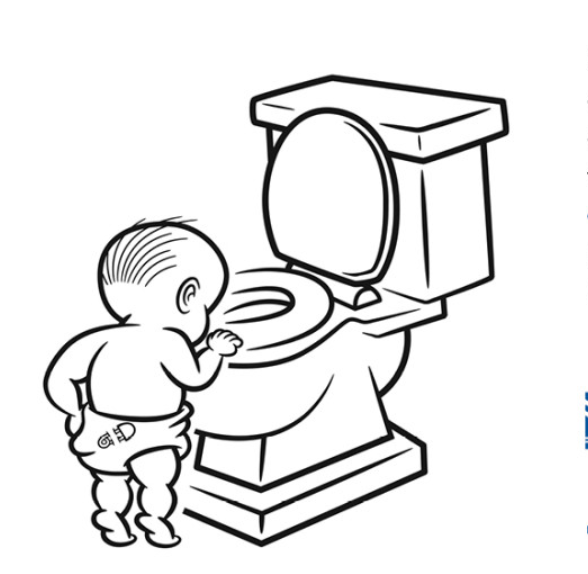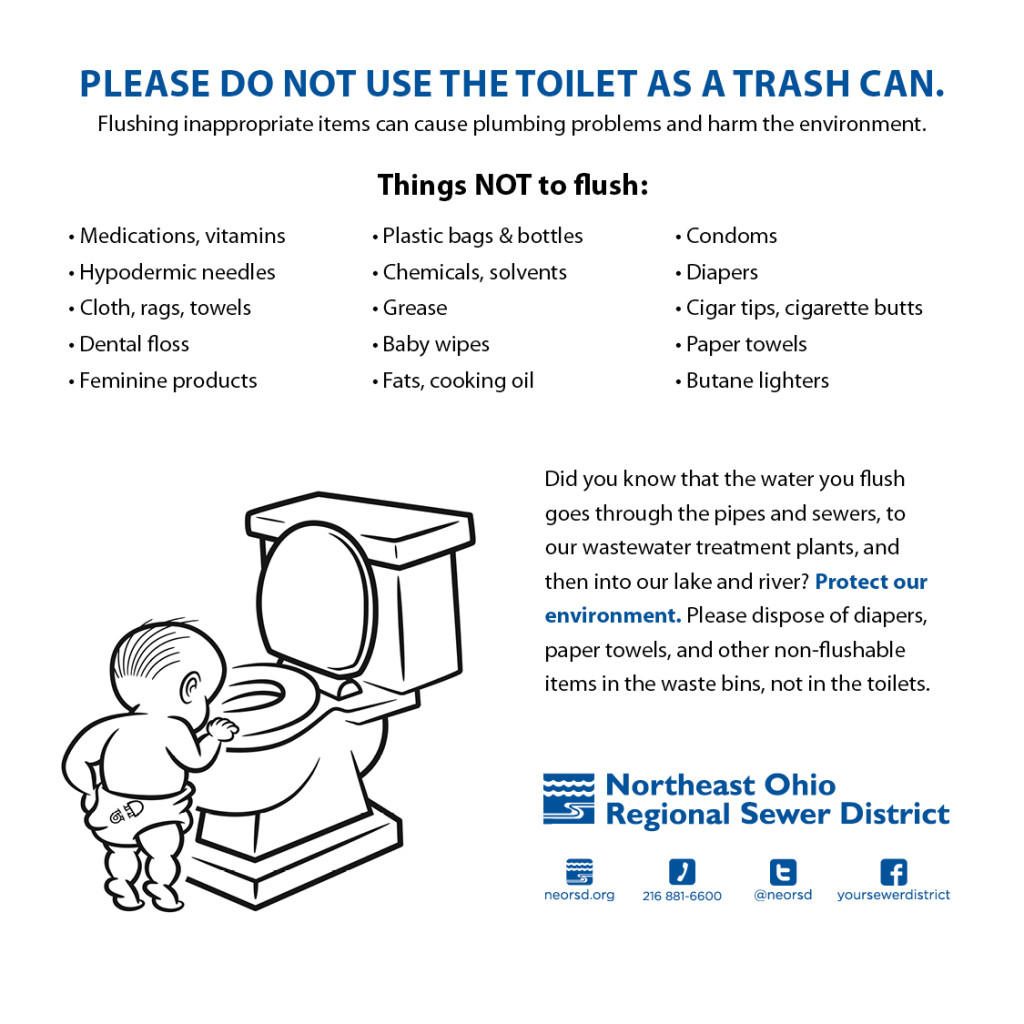
Reflect Before You Flush
This guest blog post is by John Gonzalez from the Northeast Ohio Regional Sewer District for World Toilet Day 2013. Please check out our ToiletsUSA page for more info. Follow #ToiletsUSA, #LiftTheLid, and #CelebrateTheToilet.
Your ability to “flush and forget” is taken for granted. Period.
In the US, access to proper and efficient sanitation does not represent the challenge it does across the world. That fact makes resources like the water and wastewater networks hidden underground something people don’t think about.
Even during the very act of washing our hands or reaching for the roll of TP, it rarely crosses our minds. We simply trust “the system.” We just do, assuming without a thought, “Well of course my toilets will flush and the water will woosh away and somehow it will get clean and come back to me whenever I turn the tap.”
Perhaps that makes World Toilet Day a chance to “Flush and reflect.”
 WTD is an opportunity to both raise awareness of sanitation issues worldwide—the sad reality of more than 2 billion people face in places like Africa and Asia—and share the importance of maintaining the hundreds of thousands of miles of sewers that make clean water possible here in America.
Across the country, our water-related infrastructure, specifically our sewer system, has its challenges: Age and inadequate maintenance lead the list, but the latest issue is not an infrastructure problem, it’s a behavior.
Many Americans use the toilet as a trash can. Any item small enough to fit down the drain is considered fair game. That’s a problem.
Wastewater treatment agencies say only three Ps are appropriate for the toilet: Pee, Poop, and toilet Paper. Anything else — paper towels, diapers, disposable wipes, and much more—can clog your own plumbing, accumulate in our sewers, or inflict millions of dollars in damage in local treatment facilities.
The National Association of Clean Water Agencies and many partners have led the charge against flushing non-dispersible products like wipes, but the product’s not going away. Changing our behavior might be the only ready solution.
The bottom line is this: Just because it can fit in your toilet doesn’t mean it’s flushable. It’s a behavior anyone can change, and it can solve a growing US wastewater-infrastructure concern. Without raising sewer rates.
When one of every three people in the world lack access to proper sanitation, we can’t take our system for granted here in the states. Reflect before you flush, put your trash in the can, and do your part to make every day, well, a World Toilet Day.
John Gonzalez is Senior Communications Specialist & Social Media Coordinator at the Northeast Ohio Regional Sewer District in Cleveland, Ohio. He received his BA in English from Baldwin Wallace University and currently works in media production where he also manages the Sewer District’s social media activities including @WallyWaterdrop and facebook.com/YourSewerDistrict.
WTD is an opportunity to both raise awareness of sanitation issues worldwide—the sad reality of more than 2 billion people face in places like Africa and Asia—and share the importance of maintaining the hundreds of thousands of miles of sewers that make clean water possible here in America.
Across the country, our water-related infrastructure, specifically our sewer system, has its challenges: Age and inadequate maintenance lead the list, but the latest issue is not an infrastructure problem, it’s a behavior.
Many Americans use the toilet as a trash can. Any item small enough to fit down the drain is considered fair game. That’s a problem.
Wastewater treatment agencies say only three Ps are appropriate for the toilet: Pee, Poop, and toilet Paper. Anything else — paper towels, diapers, disposable wipes, and much more—can clog your own plumbing, accumulate in our sewers, or inflict millions of dollars in damage in local treatment facilities.
The National Association of Clean Water Agencies and many partners have led the charge against flushing non-dispersible products like wipes, but the product’s not going away. Changing our behavior might be the only ready solution.
The bottom line is this: Just because it can fit in your toilet doesn’t mean it’s flushable. It’s a behavior anyone can change, and it can solve a growing US wastewater-infrastructure concern. Without raising sewer rates.
When one of every three people in the world lack access to proper sanitation, we can’t take our system for granted here in the states. Reflect before you flush, put your trash in the can, and do your part to make every day, well, a World Toilet Day.
John Gonzalez is Senior Communications Specialist & Social Media Coordinator at the Northeast Ohio Regional Sewer District in Cleveland, Ohio. He received his BA in English from Baldwin Wallace University and currently works in media production where he also manages the Sewer District’s social media activities including @WallyWaterdrop and facebook.com/YourSewerDistrict.
 WTD is an opportunity to both raise awareness of sanitation issues worldwide—the sad reality of more than 2 billion people face in places like Africa and Asia—and share the importance of maintaining the hundreds of thousands of miles of sewers that make clean water possible here in America.
Across the country, our water-related infrastructure, specifically our sewer system, has its challenges: Age and inadequate maintenance lead the list, but the latest issue is not an infrastructure problem, it’s a behavior.
Many Americans use the toilet as a trash can. Any item small enough to fit down the drain is considered fair game. That’s a problem.
Wastewater treatment agencies say only three Ps are appropriate for the toilet: Pee, Poop, and toilet Paper. Anything else — paper towels, diapers, disposable wipes, and much more—can clog your own plumbing, accumulate in our sewers, or inflict millions of dollars in damage in local treatment facilities.
The National Association of Clean Water Agencies and many partners have led the charge against flushing non-dispersible products like wipes, but the product’s not going away. Changing our behavior might be the only ready solution.
The bottom line is this: Just because it can fit in your toilet doesn’t mean it’s flushable. It’s a behavior anyone can change, and it can solve a growing US wastewater-infrastructure concern. Without raising sewer rates.
When one of every three people in the world lack access to proper sanitation, we can’t take our system for granted here in the states. Reflect before you flush, put your trash in the can, and do your part to make every day, well, a World Toilet Day.
John Gonzalez is Senior Communications Specialist & Social Media Coordinator at the Northeast Ohio Regional Sewer District in Cleveland, Ohio. He received his BA in English from Baldwin Wallace University and currently works in media production where he also manages the Sewer District’s social media activities including @WallyWaterdrop and facebook.com/YourSewerDistrict.
WTD is an opportunity to both raise awareness of sanitation issues worldwide—the sad reality of more than 2 billion people face in places like Africa and Asia—and share the importance of maintaining the hundreds of thousands of miles of sewers that make clean water possible here in America.
Across the country, our water-related infrastructure, specifically our sewer system, has its challenges: Age and inadequate maintenance lead the list, but the latest issue is not an infrastructure problem, it’s a behavior.
Many Americans use the toilet as a trash can. Any item small enough to fit down the drain is considered fair game. That’s a problem.
Wastewater treatment agencies say only three Ps are appropriate for the toilet: Pee, Poop, and toilet Paper. Anything else — paper towels, diapers, disposable wipes, and much more—can clog your own plumbing, accumulate in our sewers, or inflict millions of dollars in damage in local treatment facilities.
The National Association of Clean Water Agencies and many partners have led the charge against flushing non-dispersible products like wipes, but the product’s not going away. Changing our behavior might be the only ready solution.
The bottom line is this: Just because it can fit in your toilet doesn’t mean it’s flushable. It’s a behavior anyone can change, and it can solve a growing US wastewater-infrastructure concern. Without raising sewer rates.
When one of every three people in the world lack access to proper sanitation, we can’t take our system for granted here in the states. Reflect before you flush, put your trash in the can, and do your part to make every day, well, a World Toilet Day.
John Gonzalez is Senior Communications Specialist & Social Media Coordinator at the Northeast Ohio Regional Sewer District in Cleveland, Ohio. He received his BA in English from Baldwin Wallace University and currently works in media production where he also manages the Sewer District’s social media activities including @WallyWaterdrop and facebook.com/YourSewerDistrict. 
I appreciate the humor in your analysis! For additional info, visit: FIND OUT MORE. What do you think?